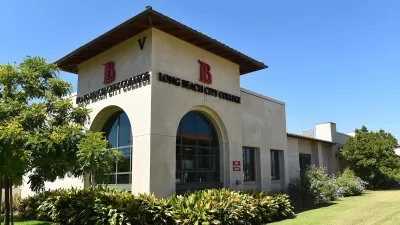John Eligon examines the private student housing building boom, and asks whether we are spoiling college students with luxurious off-campus amenities to the detriment of academic and social environments.
With growing freshman classes (up 28 percent in the last five years at the University of Missouri, for instance) universities are relying more and more on private off-campus developments to house their students.
Unlike on-campus housing, which is more modest and includes traditional learning facilities like classrooms and resident faculty, the off-campus housing trend appears to eclipse learning altogether through recreation and relaxation. Elaborate game rooms, beach volleyball courts, outdoor pools and workout machinery that integrates email, all make for an isolated, purportedly stress-free environment where students can socialize and entertain the notion of skipping classes altogether.
At the University of Missouri's Columbia campus, private developers are housing over 3,800 students in units built over the last two years. Rental rates are competitive with the on-campus living costs, yet double the cost of older housing in the area, leading to a cultural divide.
Apart from these culture wars and the debate over how much learning is lost in these off-campus environments, there is concern among market analysts and university officials that this is just another bubble about to burst.
FULL STORY: In student housing, luxuries overshadow studying

Maui's Vacation Rental Debate Turns Ugly
Verbal attacks, misinformation campaigns and fistfights plague a high-stakes debate to convert thousands of vacation rentals into long-term housing.

Planetizen Federal Action Tracker
A weekly monitor of how Trump’s orders and actions are impacting planners and planning in America.

In Urban Planning, AI Prompting Could be the New Design Thinking
Creativity has long been key to great urban design. What if we see AI as our new creative partner?

King County Supportive Housing Program Offers Hope for Unhoused Residents
The county is taking a ‘Housing First’ approach that prioritizes getting people into housing, then offering wraparound supportive services.

Researchers Use AI to Get Clearer Picture of US Housing
Analysts are using artificial intelligence to supercharge their research by allowing them to comb through data faster. Though these AI tools can be error prone, they save time and housing researchers are optimistic about the future.

Making Shared Micromobility More Inclusive
Cities and shared mobility system operators can do more to include people with disabilities in planning and operations, per a new report.
Urban Design for Planners 1: Software Tools
This six-course series explores essential urban design concepts using open source software and equips planners with the tools they need to participate fully in the urban design process.
Planning for Universal Design
Learn the tools for implementing Universal Design in planning regulations.
planning NEXT
Appalachian Highlands Housing Partners
Mpact (founded as Rail~Volution)
City of Camden Redevelopment Agency
City of Astoria
City of Portland
City of Laramie





























